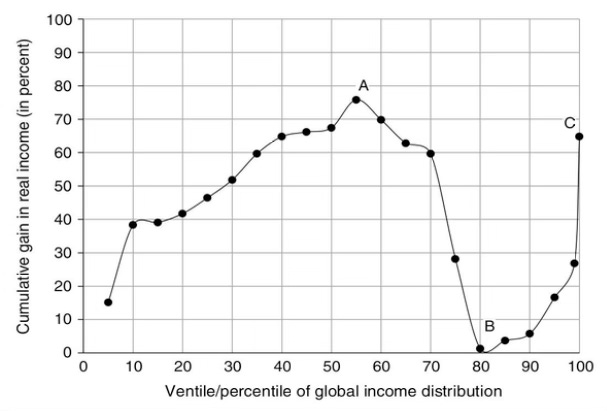Backlash against inequitable globalisation [Part II]
How anti-globalisation discourse got entangled by right-wing extremist narratives
[Work in Progress]
Sawyer, M. (2017) ‘Towards de-financialization’, in Ülgen, F. (ed.) Financial Development, Economic Crises and Emerging Market Economies, New York, NY: Routledge.
Beaverstock, J. V. and Hay, I. (2016) ‘They’ve ‘never had it so good’: the rise and rise of the super-rich and wealth inequality’, in Beaverstock, J. V. and Hay, I. (eds.) Handbook on Wealth and the Super-Rich, Cheltenham: Edward Elgar Publishing, pp. 1-17
#of people in poverty or at risk of falling into poverty - 14m in Germany (Big Issue)
Relative gain in real per capita income by global income level, 1988-2008
© Milanović (2016)
Cum-Ex — Financial Crisis — Panama Papers
Basing post on following post: <https://www.linkedin.com/posts/daniele-m-4a2175221_china-steals-american-jobs-china-manipulates-activity-7318186769064112129-eUhJ?utm_source=share&utm_medium=member_ios&rcm=ACoAABroZAoBTLZgkbFWD4REGeRZ7l-APZhaFwI>
“China steals American jobs. China manipulates currency. China exploits the American economy.
Politicians, notably Donald Trump, hammer these points relentlessly, shaping a narrative that China is America's greatest economic enemy.
The uncomfortable truth is far closer to home. China didn't steal American jobs, America willingly gave them away.
Thirty years ago, America had a strategy. Outsource manufacturing jobs to China and Mexico. Send service jobs to India.
It seemed brilliant. Let others handle low-end labor; America would dominate technology, intellectual property, and branding. Thomas Friedman's bestseller "The World Is Flat" celebrated this vision, promising a brighter future for Americans.
Something critical was missing, though, who exactly would benefit?
Massive corporations certainly did. Companies like IBM, Cisco, Microsoft, and Motorola reaped immense profits from globalization. Corporations grew unimaginably wealthy, their market values soaring over 100-fold in three decades.
Where did those profits go? Did average Americans see a better life?”
Sources:
[1] …
Piketty, Zucman et al
Bourdieu, P. (1998) ‘La précarité est aujourd’hui partout’, in Contre Feux, Grenoble: Raisons D’Agir.
Milanović, B. (2016) Global Inequality: A New Approach for the Age of Globalization, London: The Belknap Press.


